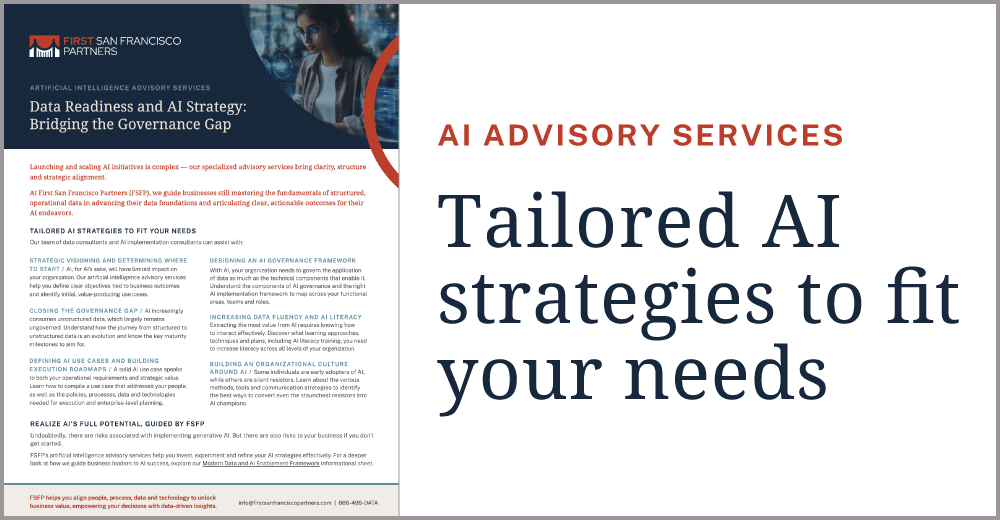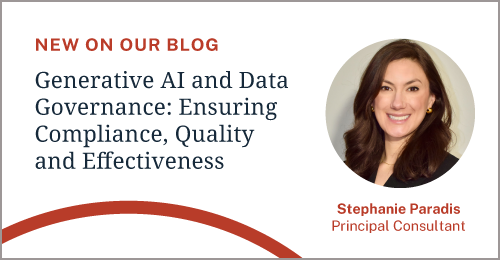Data mesh and data marketplaces are hot topics. The right data products are critical to evolving your organization’s data strategy.
Data products have become the most buzzed-about development in data management. But what exactly are they, how are data products delivered, and what are the organizational benefits of treating data as a product?
What Is a Data Product?
Data products serve as the foundation for a data mesh and data marketplace. A data product is a reusable data asset designed to deliver a trusted data-driven outcome for a specific purpose. It makes finding and consuming organizational data as easy as shopping on Amazon.
A data product integrates data from relevant source systems, processes it, ensures compliance and makes it available to anyone with the proper credentials. Data products can include all forms of data found throughout the organization, including raw data, derived data, datasets, algorithms, reports for decision-making and automated decision-making.
When you think about data as a product, consider the value of enterprise data, how your end users use it and the value the data delivers.
Every data product should be aligned directly with your key business strategies to drive the organization forward as it relates to people, processes and technology — all with a strong focus on data.
Data Product Best Practices
A product management approach ensures that the delivery value of your data aligns with users’ needs for that product (data!).
First, it is imperative to consider where you’re heading as an overall organization, as a division or as a department. With a value-centric roadmap, you can gain a deeper understanding of the contribution of your data analytics products. Ask yourself, in 2023, how critical will it be to manage the bottom line and operating expenses — and how does enterprise data help deliver these goals? Will mergers and acquisitions be a driving force for growth? Planning early for the data needs for data sharing and data integration between systems is critical to de-risk successful M&A execution. Is a significant digital transformation effort underway that requires a sharpened focus on data curation and quality to enable more mature artificial intelligence (AI) and machine learning (ML) utilization?
Every data product should be aligned directly with your key business strategies to drive the organization forward as it relates to people, processes and technology — all with a strong focus on data.
Next, it’s important to consider the consumers, producers and security for the data product and build an iterative delivery practice:
- Who is the consumer of the data?
- How is it produced?
- How is this data secured and accessed?
Iterative delivery of data leverages agile practices to ensure that users’ stories are focused on the consumer and producer requirements for data products while providing continuous value to those end-users. The data product manager is accountable and responsible for the value delivered and the user experience. Data product managers are assigned and aligned to a business data domain to support business, stakeholder and steward needs for data products in that domain. For instance, finance data products drive and enable data products for financial reporting and analysis to manage financial operations, the organizational P&L and financial performance. Finally, data product managers must include data stewards and custodians from their respective domains throughout the agile delivery process to define user stories, test resultant data products, and support usability testing of the end data products.
Data products must deliver truthful, non-erroneous data to downstream consumers consistently. And those consumers must be able to reuse them and find meaningful information from them.
Data Product Characteristics
A solid data product enables faster decision-making, easier compliance, builds customer trust and can reduce data duplication. This makes it easier for organizations to create a single source of truth. A reliable data product should have the following characteristics.
Discoverable, understandable and trustworthy – By sharing and updating information about each data product, including its data, meaning, format, shape and refresh cycle, domain teams facilitate discovery and understanding. To ensure trustworthiness, data product interfaces must provide information about data quality, timeliness, data lineage and the calculation process, so downstream consumers are informed of changes in data and shape as soon as possible.
Addressable, natively accessible and secure – To safeguard customer data and ensure the data is protected for internal and external uses across multiple platforms and use cases, define compliant processes for finding, gaining access to and using the data. Data products must utilize different security measures based on access requirements — the ownership mentality shifts from gatekeeping to serving data under clearly defined security protocols. There are well-documented policies and interfaces available, which can vary in technology. APIs, database users, tables and views and files with appropriate access rights are commonly used interfaces for natively accessible data products.
Interoperable, truthful and valuable – To provide interoperability, data products must follow defined common standards, such as the same names and data types for values. Data products must deliver truthful, non-erroneous data to downstream consumers consistently. And those consumers must be able to reuse them and find meaningful information from them.
Understanding and communicating how each business strategy and corresponding use case delivers value is imperative.
Got Vision?
To make your enterprise data products as valuable and useful as possible, we recommend these tactics.
Develop Data Product Roadmaps
Your data product roadmaps should ensure your business needs and architecture plans align with end-user needs, user stories and, ultimately, your product value. The most important business strategies will influence the product roadmap priorities.
As an example, evolving regulatory legislation drives the requirement for maturity of data privacy and compliance products. New consumer products drive analytics and data reporting needs and maturity. And new digital transformation roadmap drives AI and ML, API designs, data quality and curation data requirements.
Develop Data Product Value Propositions
Understanding and communicating how each business strategy and corresponding use case delivers value is imperative, so be sure you can answer these questions:
- How does data support the strategy of the company?
- Which users will be using this use case, and what value will the data provide?
- How will the value of the data product be measured, calculated and improved?
- How much investment and value does that use case provide?
Develop a Data Product User Focus
It’s essential to understand your end users’ challenges to identify solutions that deliver value. Usability testing and usage analyses offer insight into product efficacy. You then understand how the product impacts users and how to deliver improved value. As a result, the product roadmap will be constantly updated, adjusted and improved in a way that directly aligns with user goals and business expectations.
Adopt Iterative Delivery
As part of an iterative, agile delivery process, data user stories (access, retention, data definition, etc.) leverage and expand existing data governance policies and standards necessary for every sprint to deliver and maintain secure, high-quality, accessible data products. To create a data mesh or data marketplace, you need to create reusable data assets which will serve multiple users and meet various data needs.
Agile delivery models must work for your business and remain flexible. They should also foster interaction among team members, creativity, innovation and consistent interaction with end users.
Ensure the people leading and driving data as a product have the skills and expertise to be effective product managers to lead and drive the iterative delivery process.
Let’s Do This Thing
The concept of data as a product sounds compelling, right? Here are steps to help you get started.
First, recruit skilled product managers. Data as a product requires product management expertise to build a roadmap, drive user adoption and the customer experience and measure the value delivered. Ensure the people leading and driving data as a product have the skills and expertise to be effective product managers to lead and drive the iterative delivery process. Effective product managers focus on the value of the product, support and drive iterative value delivery, are maniacally focused on the end-user experience and align product roadmap and associated benefits to key enterprise goals and strategies. It’s crucial that product managers clearly understand business priorities and identify the end users who need to be involved in the process.
Then, ensure that data management and governance are critical elements of your data product management process.
How Can We Help You?
If you need assistance with roadmap planning or finding and hiring exceptional product managers or organizational design and change professionals, FSFP can help you.
From governance and architecture to processes and privacy, we’re obsessed with all things data. Our experts will ensure your business remains at the forefront of data advancements from strategy to development and implementation.
For more than 15 years, we’ve helped companies across diverse industries navigate data change to scale the value of insights and convert data value into measurable business value — with collaborative data governance at the core.
I invite you to learn more about FSFP’s services and contact us.
Article contributed by Nellie McBride


